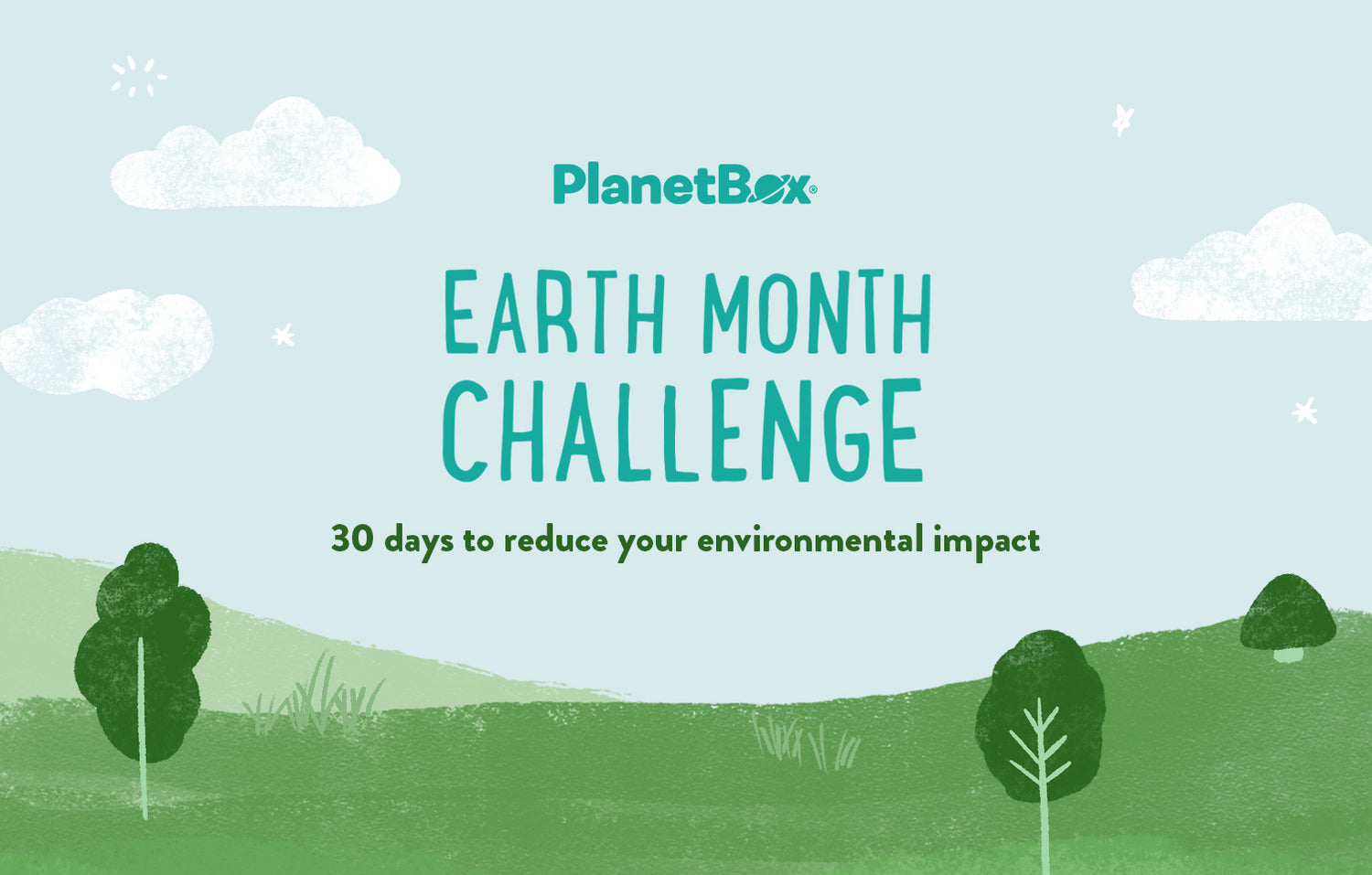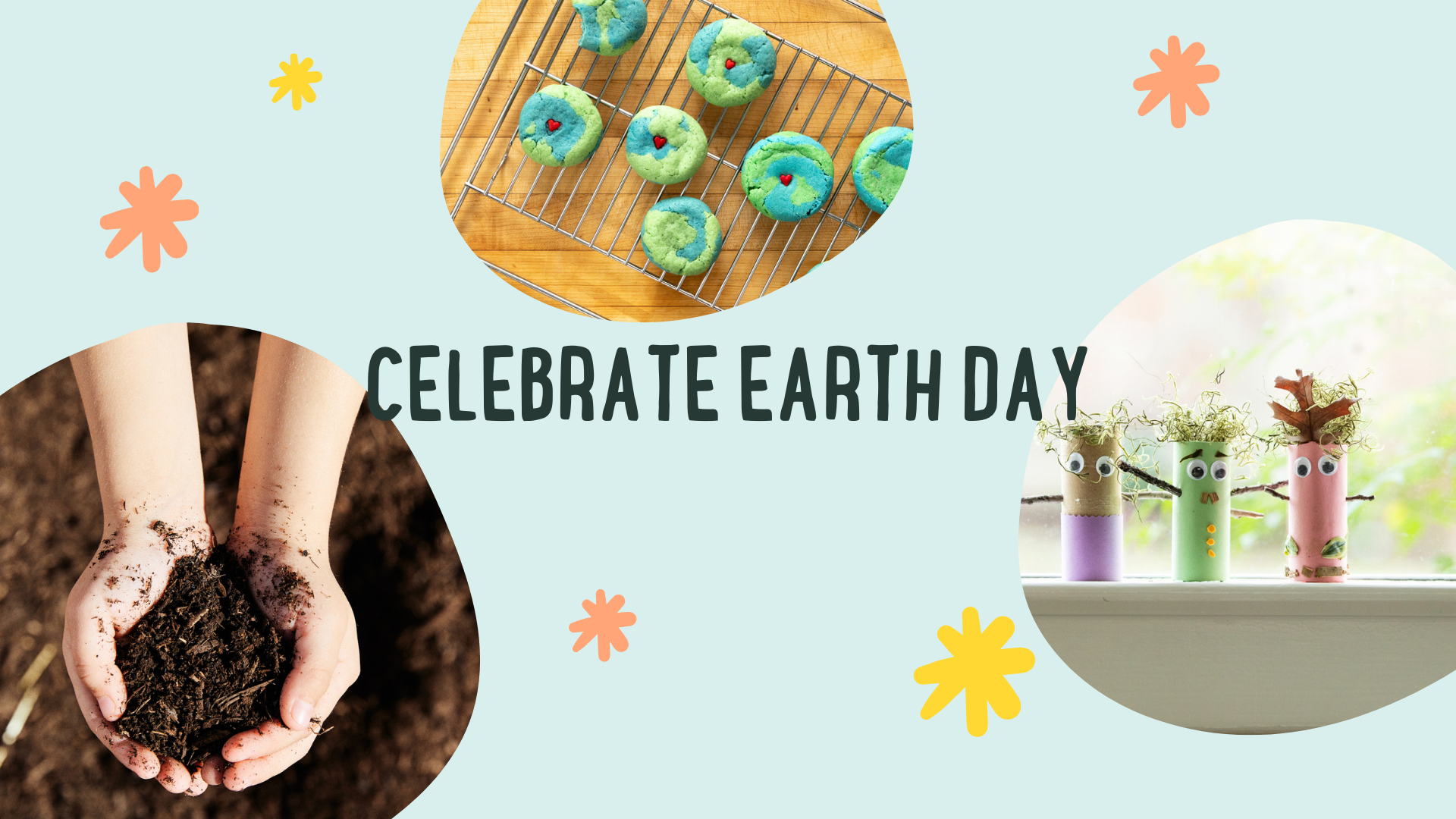This month our team at PlanetBox are celebrating the 50th anniversary of Earth Day and we’re challenging ourselves and our community to do more. We’ve created a calendar for each day in April as an action item that helps reduce our individual environmental impact and we want you to join us. Together our actions go further. On their own, none of these actions will save the world. But each day offers a chance to incorporate a more eco-friendly behavior into your everyday life.
If we start being better, together, we can do a lot of good.
We created a 30 day calendar for you to put up in your house and follow along with the challenge. It’s ok if you miss a day or two, just pick up where you left off until you make your way through each action item. Print out the calendar to check off each day by downloading here.
Day 1: Set intentions
The first day is easy peasy! Just commit to attempting each day and ask a friend to join. Together you can help keep each other accountable.
Day 2: Regrow veggies
Did you know that you can save some of your leftover food scraps and regrow them in water? Not only does this help cut food waste but it can also help trim your grocery bill. Learn more details on how to do this here.
Day 3: Educate yourself
Whether you’re new to the environmental movement or you were on the frontlines for the first Earth Day rally 50 years ago there is always something to learn more about. Check out this list that incorporates some of our favorite environmental documentaries streaming on Netflix now!
Day 4: No new plastic bags
Got any leftover fabrics laying around? Now is a great time to sew your own produce bags! Follow this DIY tutorial and ditch the plastic produce bags for good. Don’t own a sewing machine? Here’s our personal favorite brand of produce bags.
Day 5: Green cleaning:
Did you know you can ditch the harsh chemicals that come in plastic bottles next time you’re shopping for cleaning products. In fact most supplies you probably already have around the house. All you need is: white vinegar, essential oils, water, and alcohol! Save your empty spray bottles and use this recipe for your next all purpose cleaner!
Day 6: Preserve water
We’re all washing our hands A LOT these days. But as we’re singing our catchy songs for 20 seconds that doesn’t mean we need to be wasting all that fresh water! Use your elbow to turn off the water next time you lather up!
Day 7: Go vegan for a day!
Going vegan even for just one day a week makes a tremendous difference in the well being of our planet. This is because of the amount of water, crops, acres, soil, and methane gas that the meat industry impacts.
Day 8: Home cook meals
This one should be easy while we’re all stuck at home but always a good reminder to try and cook meals as a family. When everyone pitches in they learn lifelong skills of how to take care of themselves. Plus it makes meal prep and cleaning much quicker!
Day 9: Opt out of junk mail
Sick of junk mail? So is the planet! Clean up your mailbox by opting out by visiting here.
Day 10: Ditch single-use
Instead of putting snacks in a zip lock baggie, invest in a reusable snack container. These can also be great for storing craft items or anything you’d use a zip lock for.
Day 11: Zero waste kit
As you enjoy a walk around the neighborhood or are out running errands make sure to always carry essentials on you at all times. Our best recommendation is to pack a tote bag full of a travel coffee mug, utensils, water bottle, and a to-go container for any snacks or meals you pick up while out. Just grab the tote before you walk out the door and you're ready to be zero waste while out and about!Day 12: Recycle like a pro
Each municipality has different recycling requirements. Did you know that there are different types of plastics and they are not all recycled equally? Here’s a great guide on the plastic identification system to help make recycling easier. Learn what your community accepts or companies like Ridwell that will help recycle for you!
Day 13: Bulk bin shopping
Bring your own jars and produce bags to shop package free items! Learn how to tare your own jars and find a store near you that has bulk bin shopping. Pro tip: Winco actually has a great bulk section at great prices.
Day 14: Shop locally
Before purchasing from the Amazon’s and Walmart’s of the world consider finding a local store that has what you are looking for. This helps save on emissions of shipping the package to you. Local stores would be extremely grateful for your order. You worked hard for your money. Spend it where it can be used the most.
Day 15: Think before you buy
Sometimes when we spend a cheap amount of money on an item, that’s exactly what we receive. Something cheap and disposable. Oftentimes we end up needing to replace it much sooner than we would have if we just spent a few more $$ to begin with. Thinking long term like this actually helps us save money and help reduce waste.
Day 16: Shorter showers
Next time you shower set a timer on your phone to find out how long your showers actually are. If it’s over 10 minutes, challenge yourself to slowly lowering that time until you hit 10 mins. Under 10? Great job! Keep challenging yourself to do better. Your utilities bill will thank you!
Day 17: Unplug electronics
Did you know you’re still using energy with your phone charger plugged into the wall even though you’re not charging your phone? Try making it a habit when you unplug your phone from the charger you also unplug from the wall. Check the outlets around your house to see where you might improve.
Day 18: Green Groceries
The next time you go grocery shopping try to see if you can shop without buying anything that comes with plastic. The more you’re aware of how much plastic is around the easier it is to discover what ways you can find alternatives. Organic sections tend to be your best bet here!
Day 19: Freeze your scraps
Instead of throwing out or composting your veggie scraps from your meal throw them in a paper bag in the freezer and use them once it gets full enough to make your own veggie stock. Just throw your frozen veggies in a big pot of boiling water for 45 mins and you just made yourself free veggie stock!
Day 20: If it breaks, fix it!
Whenever something breaks we so often pull out our wallets to replace it immediately. Before you do this consider if it’s something you can fix. Oftentime it is and it can be a lot cheaper to spend the time to fix an item rather than replacing it.
Day 21: Ordering take-out
There are so many amazing restaurants out there and it has never been easier to just call and have someone else make you dinner after a stressful day. When you place your order ask them to ditch the bag, utensils, and napkins they often pack your order with.
Day 22: Eat your produce first
As you go through your fridge each day planning what to eat, create a designated shelf or drawer where you place all of your vegetables that need to be eaten in the next day or two. By doing this you can prioritize what to cook and waste less food.
Day 23: Choose cloth paper towels
Paper towels can be composted but the individual plastic wrapped rolls cannot. This plastic adds up over your lifetime. Instead opt for using cloth towels to clean your messes and wash when needed. We suggest dyeing your cloth for their different uses like green for the kitchen, red toilets/floors, and blue for all-purpose like windows and coffee tables.
Day 24: Cook & clear it out
Some families refer to this as, silly dinner night. This is where you cook all the random items in your kitchen that don’t make up a complete meal and might go to waste. It often ends up being random items that normally don’t go together on your plate. Kids tend to love silly dinner night!
Day 25: Start an herb garden
Find an empty spot in your garden at home or get a large pot to grow your own herb garden! This allows you to spice up any dish every night of the week.
Day 26: Opt for bar soap
With the eco-wave gaining traction over the past several years there has been an increase in great bar soaps for shampoo, conditioner, and body! Try one out next time you run out.
Day 27: Dear legislators,
Is something important to you and you want the government to know? Write to your local officials and tell them what’s on your mind. Here’s how.
Day 28: Reuse again and again
Before recycling your plastic or glass container, is there another purpose it could serve first? Paint brush holder? Bulk food? Organizer? The options are endless!
Day 29: Compost your scraps
This day is similar to recycling. Learn what can and can’t be composted in your local area. For example, not every municipality allows the plastic forks with a composting symbol to be composted in your local curbside pick up. Don’t have curbside composting in your area? Learn how you can start composting at home.
Day 30: Congrats!
You completed a month's worth of action items that contributed to changing habits for the earth. Celebrate by enjoying a nice walk around the neighborhood. Lounging in your yard, or simply opening up the windows and taking a deep breath of fresh air.



Leave a comment
This site is protected by hCaptcha and the hCaptcha Privacy Policy and Terms of Service apply.